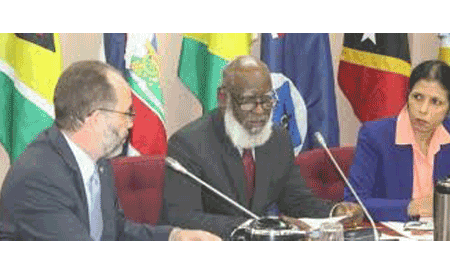BELIZE CITY, Thurs. June 7, 2018– A United States resolution to suspend Venezuela from the Organization of American States went down in defeat on Tuesday, when the 34-member OAS called an extraordinary assembly to vote on the resolution.
In order to succeed the resolution needed the support of twenty-four countries, but it only received the support of nineteen countries.
The US resolution found support among the fourteen countries that make up the so-called Lima Group: Argentina, Brazil, Canada, Colombia, Costa Rica, Guyana, Guatemala, Honduras, Mexico, Panama, Paraguay, Peru and Saint Lucia.
The Dominican Republic, Bahamas, Jamaica and Barbados also voted in favor of the resolution.
The eleven countries that abstained were Surinam, Saint Kitts and Nevis, Trinidad and Tobago, Belize, Uruguay, Antigua and Barbuda, Ecuador, El Salvador, Grenada, Haiti and Nicaragua.
The four countries that voted against the resolution were Venezuela, Bolivia, Dominica and Saint Vincent and the Grenadines.
Only two times in the OAS’s history were countries suspended, and that was in 2009 when Honduras was suspended after a coup ousted President Manuel Zelaya, and in 1962, when Cuba was suspended for its embrace of the Marxist-Leninist philosophy.
The US resolution was triggered by the result of the recent election in Venezuela that returned President Nicholas Maduro to power for a second term.
Belize has been an ally of Venezuela and has profited to the tune of several hundred million dollars from the Petrocaribe agreement that has allowed Belize concessionary terms on the purchase of Venezuelan fuel.
Belize’s Minister of Foreign Affairs, Wilfred Elrington, in his address to the OAS, held out the hope that a compromise could be reached to end the suffering of the Venezuelan people.
Foreign Minister Elrington told the OAS, “It is being widely contended that there are widespread violations of human rights in this sister country, which is, inter alia, conducive to spread exodus from the country and that the democratic order is disruptive. As on every other occasion when our organization has been confronted with such grave and weighty allegations against a member state, our membership is invariably divided, if not polarized, on the issue. On this occasion we are divided both on the issue of the veracity of the allegations as well as on the issue of how best to treat the situation. Likewise each time our organization is confronted with such divisive issues, there arises the dreaded specter of a possible fracture of the organization, a specter which is in no wise fanciful, given the recent Brexit phenomenon. But the history of the organization shows it to be a most resilient organization. It has repeatedly demonstrated its capacity to find acceptable solutions to seemingly intractable problems. I end this brief intervention with no solution of my own, but merely with a few questions. The first is this: is it really the case that the Venezuelan crisis is a matter of such fundamental principle on which compromise is absolutely unattainable? Two, is this crisis indeed beyond the capacities of our hemispheric leaders to come up with a peaceful solution which will end the horrendous suffering of the Venezuelan people and of their friends, which will conduce to a political accord between the opposing factions which is the only guarantee for a lasting peace in Venezuela?”
Venezuelan president Nicholas Maduro has characterized the OAS as a pawn of US foreign policy and last year the country began the two-year process to leave the organization in 2019, Reuters reported from the Venezuelan capital Caracas, on Tuesday.

